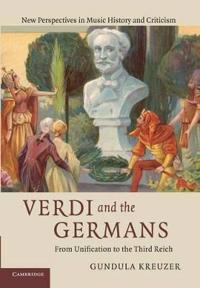
endast ny
Verdi and the Germans
This seminal study of Giuseppe Verdi's German-language reception provides important new perspectives on German musical culture and nationalism from the mid-nineteenth century onwards. Kreuzer argues that the concept of Germany's musical supremacy, so dear to its nationalist cause, was continually challenged by the popularity of Italian opera, a genre increasingly epitomised by Verdi. The book traces the many facets of this Italian-German opposition in the context of intense historical developments from German unification in 1871 to the end of World War II and beyond. Drawing on an exceptionally broad range of sources, Kreuzer explores the construction of visual and biographical images of Verdi; the marketing, interpretation and adaptation of individual works; regional, social and religious undercurrents in German musical life; and overt political appropriations. Suppressed, manipulated and, not least, guiltily enjoyed, Verdi emerges as a powerful influence on German intellectuals' ideas about their collective identity and Germany's paradigmatic musical Other.
Utgiven: 2014
ISBN: 9781107638402
Förlag: Cambridge University Press
Format: Häftad
Språk: Engelska
Sidor: 384 st
This seminal study of Giuseppe Verdi's German-language reception provides important new perspectives on German musical culture and nationalism from the mid-nineteenth century onwards. Kreuzer argues that the concept of Germany's musical supremacy, so dear to its nationalist cause, was continually challenged by the popularity of Italian opera, a genre increasingly epitomised by Verdi. The book traces the many facets of this Italian-German opposition in the context of intense historical developments from German unification in 1871 to the end of World War II and beyond. Drawing on an exceptionally broad range of sources, Kreuzer explores the construction of visual and biographical images of Verdi; the marketing, interpretation and adaptation of individual works; regional, social and religious undercurrents in German musical life; and overt political appropriations. Suppressed, manipulated and, not least, guiltily enjoyed, Verdi emerges as a powerful influence on German intellectuals' ideas about their collective identity and Germany's paradigmatic musical Other.
Ny bok
352 kr370 kr
5% studentrabatt med Studentapan
Begagnad bok (0 st)
Varje vecka tillkommer tusentals nya säljare. Bevaka boken så får du meddelande när den finns tillgänglig igen.



